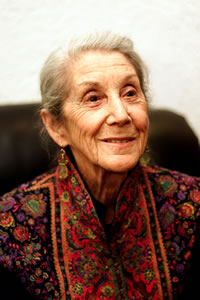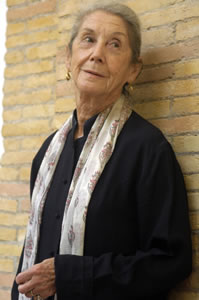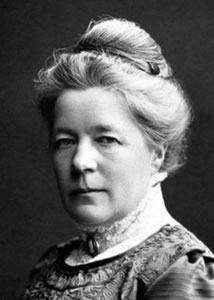De Zuidafrikaanse schrijfster Nadine Gordimer werd geboren op 20 november 1923 in Springs. Zie ook mijn blog van 20 november 2006 en ook mijn blog van 20 november 2007.
Uit: Loot and other stories
„Once upon our time, there was an earthquake: but this one is the most powerful ever recorded since the invention of the Richter scale made it possible for us to measure apocalyptic warnings.
It tipped a continental shelf. These tremblings often cause floods; this colossus did the reverse, drew back the ocean as a vast breath taken. The most secret level of our world lay revealed: the sea-bedded-wrecked ships, facades of houses, ballroom candelabra, toilet bowl, pirate chest, TV screen, mail-coach, aircraft fuselage, cannon, marble torso, Kalashnikov, metal carapace of a tourist bus-load, baptismal font, automatic dishwasher, computer, swords sheathed in barnacles, coins turned to stone. The astounded gaze raced among these things; the population who had fled from their toppling houses to the maritime hills ran down. Where terrestrial crash and bellow had terrified them, there was naked silence. The saliva of the sea glistened upon these objects; it is given that time does not, never did, exist down here where the materiality of the past and the present as they lie has no chronological order, all is one, all is nothing-or all is possessible at once.
People rushed to take; take, take. This was-when, anytime, sometime-valuable, that might be useful, what was this, well someone will know, that must have belonged to the rich, it’s mine now, if you don’t grab what’s over there someone else will, feet slipped and slithered on seaweed and sank in soggy sand, gasping sea-plants gaped at them, no-one remarked there were no fish, the living inhabitants of this unearth had been swept up and away with the water. The ordinary opportunity of looting shops which was routine to people during the political uprisings was no comparison. Orgiastic joy gave men, women and their children strength to heave out of the slime and sand what they did not know they wanted, quickened their staggering gait as they ranged, and this was more than profiting by happenstance, it was robbing the power of nature before which they had fled helpless. Take, take; while grabbing they were able to forget the wreck of their houses and the loss of time-bound possessions there. They had tattered the silence with their shouts to one another and under these cries like the cries of the absent seagulls they did not hear a distant approach of sound rising as a great wind does. And then the sea came back, engulfed them to add to its treasury.“

Nadine Gordimer (Springs. 20 november 1923)
De Amerikaanse schrijver Don DeLillo werd op 20 november 1936 geboren in New York City als zoon van Italiaanse immigranten. Als tiener las hij al erg veel. Toen werd ook zijn interesse om zelf te schrijven gewekt. Hij volgde een opleiding aan de Fordham University, waar hij zijn bachelordiploma haalde in 1958. Nadat hij afgestudeerd was, ging hij aan de slag in de reclamewereld. Hij werkte vijf jaar als copywriter. Daarna werd hij fulltime schrijver. De eerste roman van DeLillo, Americana, werd in 1971 uitgegeven. In de late jaren zeventig woonde hij ettelijke jaren in Griekenland. Tijdens zijn verblijf in Griekenland schreef DeLillo zijn roman De namen (1982). Zijn bekendste werk is Onderwereld, dat in 1997 gepubliceerd werd. Het boek werd wereldwijd geprezen als een meesterwerk en gaat over de geschiedenis van Amerika in de voorbije decennia.
Uit: Still Life
“When he appeared at the door, it was not possible, a man come out of an ash storm, all blood and slag, reeking of burned matter, with pinpoint glints of slivered glass in his face. He looked immense, in the doorway, with a gaze that had no distance in it. He carried a briefcase and stood slowly nodding. She thought he might be in shock but didn’t know what this meant in precise terms, medical terms. He walked past her toward the kitchen and she tried calling her doctor, then 911, then the nearest hospital, but all she heard was the drone of overloaded lines. She turned off the TV set, not sure why, protecting him from the news he’d just walked out of, that’s why, and then went into the kitchen. He was sitting at the table, and she poured him a glass of water and told him that Justin was with his grandmother, released early from school and also being protected from the news, at least as it concerned his father.
He said, “Everybody’s giving me water.”
She thought he could not have travelled all this distance or even climbed the stairs if he’d suffered serious injury, grievous blood loss.
Then he said something else. His briefcase sat beside the table like something yanked out of a landfill. He said there was a shirt coming down out of the sky.
She poured water on a dishcloth and wiped dust and ash from his hands, face, and head, careful not to disturb the glass fragments. There was more blood than she’d realized at first, and then she began to realize something else—that his cuts and abrasions were not severe or numerous enough to account for all this blood. It was not his blood. Most of it came from somebody else.”
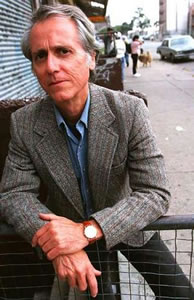
Don DeLillo (New York City, 20 november 1936)
De Engelse dichter en schrijver Thomas Chatterton werd geboren op 20 november 1752 in Bristol als zoon van een koster. Toen hij elf jaar was schreef hij al een satire over een methodist. Als veertienjarige werd hij klerk bij een advocaat in Bristol. Kort daarna presenteerde hij gedichten die – volgens hem – geschreven waren door een monnik, genaamd Rowley, uit de vijftiende eeuw. Het werk baarde groot opzien en bestond o.a. uit een feestgedicht ter gelegenheod ban de wijding van een brug,fagmenten van een treurspel, en ballade-achtige verzen over de veroveringen van dde Noormannen. De kritiek verklaarde het al snel tot vervalsing. Chatterton werd ontslagen en zocht in Londen steun bij de schrijver en politicus Sir Horace Walpole. Deze was al gewaarschuwd voor de jongeman en weigerde zijn steun. Korte tijd later doodde Chesterton zichzelf door gif in te nemen. Het volledige werk werd in 1842, en ook nog eens in 1871 in Londen uitgegeven.
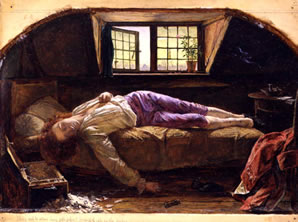
The Death of Chatterton door Henry Wallis
Song from Aella
O SING unto my roundelay,
O drop the briny tear with me;
Dance no more at holyday,
Like a running river be:
My love is dead,
Gone to his death-bed
All under the willow-tree.
Black his cryne as the winter night,
White his rode as the summer snow,
Red his face as the morning light,
Cold he lies in the grave below:
My love is dead,
Gone to his death-bed
All under the willow-tree.
Sweet his tongue as the throstle’s note,
Quick in dance as thought can be,
Deft his tabor, cudgel stout;
O he lies by the willow-tree!
My love is dead,
Gone to his death-bed
All under the willow-tree.
Hark! the raven flaps his wing
In the brier’d dell below;
Hark! the death-owl loud doth sing
To the nightmares, as they go:
My love is dead,
Gone to his death-bed
All under the willow-tree.
See! the white moon shines on high;
Whiter is my true-love’s shroud:
Whiter than the morning sky,
Whiter than the evening cloud:
My love is dead,
Gone to his death-bed
All under the willow-tree.
Here upon my true-love’s grave
Shall the barren flowers be laid;
Not one holy saint to save
All the coldness of a maid:
My love is dead,
Gone to his death-bed
All under the willow-tree.
With my hands I’ll dent the briers
Round his holy corse to gre:
Ouph and fairy, light your fires,
Here my body still shall be:
My love is dead,
Gone to his death-bed
All under the willow-tree.
Come, with acorn-cup and thorn,
Drain my heartes blood away;
Life and all its good I scorn,
Dance by night, or feast by day:
My love is dead,
Gone to his death-bed
All under the willow-tree.
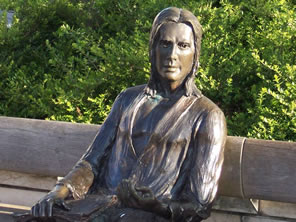
Thomas Chatterton (20 november 1752 – 5 augustus 1770)
De Iraanse dichteres, vertaalster en mensenrechten-advocate Sheema Kalbasi werd geboren op 20 november 1972 in Teheran. Zij is o.a. directeur van Dialogue of Nations through Poetry in Translation en van het Iraanse Vrouwen Poëzie Project. Zij publiceerde twee gedichtenbundels, Echoes in Exile in het Engels en Sangsar (Steniging) in het Farsi. Verder stelde zij een tweetalige bloemlezing samen van Iraanse (Perzische) dichteressen van het middeleeuwse Perzië tot het hedendaagse Iran. Haar eigen gedichten zijn al in achttien talen vertaald. Kalbasi deed ook vrijwilligerswerk met Koerdische kinderen in Irak en met Pakistaanse kinderen in Pakistan. Tegenwoordig woont zij met man en kinderen in de VS.
Dancing Tango
Oh, Orlando!
Remember the night we danced
quietly on the sands where music
was played? Your words were
wonderers, said quietly
in the pockets of my ears.
Oh, Esphahan!
With your turquoise blue mosques
and lovers hiding under the sands
by the Zayandehrood and its haunting
blue skies. Still the words did
wonders when they were said quietly
in the pockets of my ears.
Time is eternity, my dignity
resides in yours and your
words are wonders that I count
as precious coins kept quietly
in the pockets of my tears.
Nothing
Nothing is all I am
Nothing overloading nothing
Closing the doors,
Opening an extra into an empty space,
Nothing ensues but a further war.
The bombs, lights that blind and Damascus,
Burning after Tehran. Sisters calling in despair,
Brothers callous the arms of infidels. Nothing happens
But children die, and journalists are filming for a deadline.
Nothing comes after nothing but I,
Kneel, cry for nothing,
and still the no shepherd birds burn at flight.
Nothing happens. I walk by the Central Park
Next to nothing, and the no flight zone is
Just nothing yet throat slides over throat,
Bullets shut and blood drops. Here nothing happens
But I write to keep nothing from overloading nothing.
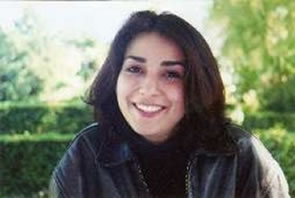
Sheema Kalbasi (Teheran, 20 november 1972)
De Russische schrijfster Yevgenia Ginzburg werd geboren op 20 november 1904 in Moskou Zij studeerde sociale wetenschappen en pedagogie in Kazan. Daarna werkte zij als lerares. Zij was na de dood van haar eerste man hertrouwd met Pavel Aksyonov, de burgemeester van Kazan en lid van de communistische partij. In 1937 werd zij uit de partij gezet en wegens vermeende contacten met de Trotskisten gearresteerd. Zij kwam in 1949 vrij, maar mocht vijf jaar lang de Magadan-zone niet verlaten. In 1950 volgde een nieuwe arrestatie en werd zij naar de regio Krasnojarskv verbannen. Na de dood van Stalin mocht zij naar Moskau reizen. Daar werkte zij weer als journaliste en publiceerde zij autobiografische boeken. In 1955 volgde een volledige rehabilitatie.
Uit: Journey into the Whirlwind (Vertaald door Paul Stevenson and Max Hayward)
“To live! Without property, but what was that to me? Let them confiscate it — they were brigands anyway, confiscating was their business. They wouldn’t get much good out of mine, a few books and clothes — why, we didn’t even have a radio. My husband was a loyal Communist of the old stamp, not the kind who had to have a Buick or a Mercedes… Ten years! …Do you [the judges], with your codfish faces, really think you can go on robbing and murdering for another ten years, that there aren’t people in the Party who will stop you sooner or later? I knew there were — and in order to see that day, I must live. In prison, if needs be, but I must at all costs live! … I looked at the guards, whose hands were still clasped behind my back. Every nerve in my body was quivering with the joy of being alive. What nice faces the guards had! Peasant boys from Ryazan or Kursk, most likely. They couldn’t help being warders — no doubt they were conscripts. And they had joined hands to save me from falling. But they needn’t have — I wasn’t going to fall. I shook back my hair curled so carefully before facing the court, so as not to disgrace the memory of Charlotte Corday. Then I gave the guards a friendly smile. They looked at me in astonishment.”

Yevgenia Ginzburg (20 november1904 – 25 mei 1977)
De Zweedse schrijfster Selma Lagerlöf werd geboren op 20 november 1858 in Östra Emterwik in Zweden. Zie ook mijn blog van 20 november 2006.
Uit: The Treasure
“Long after him a man and a woman entered the door. They were poorly clad and lingered bashfully in the corner between door and fireplace.
The host at once came forward to his two guests. He took the hand of each and led them up the room. Then he said to the others: “Is it not truly said that the shorter the way the more the delay? These are our nearest neighbors. Branehog had no other tenants besides them and me.”
“Say rather there are none but you,” said the man. “You cannot call me a tenant. I am only a poor charcoal-burner whom you have allowed to settle on your land.”
The man seated himself beside Torarin and they began to converse. The newcomer told Torarin how it was he came so late to the feast. It was because their cabin had been visited by three strangers whom they durst not leave, three journeymen tanners who had been with them all day. When they came in the morning they were worn out and ailing; (…)“
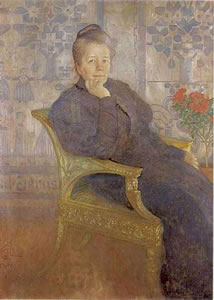
Selma Lagerlöf (20 november 1858 – 16 maart 1940)
Portret door Carl Larsson (1908)

